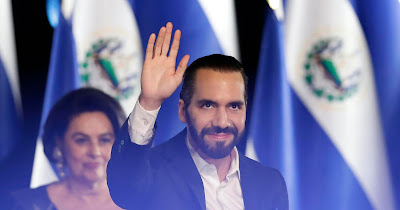San Salvador (EFE).- The Supreme Electoral Tribunal (TSE) handed Nayib Bukele his credential as the elected president for the 2024-2029 term, after achieving re-election on February 4th for a second consecutive term despite the Constitution prohibiting it.
The vice
president-elect, Félix Ulloa, also received his credential at a ceremony held
at the National Theater of San Salvador, in the heart of the capital, and
broadcasted nationwide on radio and television.
"The
Supreme Electoral Tribunal fulfills its duty to the country by declaring
citizens elected through the free, sovereign, secret, and equal vote of the
population," said TSE president Dora Esmeralda Martínez.
She
ensured that "we fulfill our duty to the country by delivering the
official credentials to the elected authorities" and described the
democratic participation of more than 3 million citizens (just over 50% of the
electoral roll) in the past elections as "historic," which
"testifies to the people's faith and confidence in the system and the
tribunal's work."
Martínez
added that the previous election day unfolded "completely normal and
orderly, with a peaceful and trouble-free vote."
The event
was attended by deputies, members of the current government's cabinet, justices
of the Supreme Court of Justice (CSJ), accredited ambassadors in the country,
representatives of international organizations, and special guests.
Bukele's
Victory
On
February 18th, the TSE confirmed Nayib Bukele's victory, from the ruling party
Nuevas Ideas (NI), in the presidential elections of February 4th, which gave
the current president 84.6% of the valid votes, more than 2.7 million.
Bukele
and Ulloa will continue in a second term at the helm of the government of El
Salvador starting June 1st for a period of five years.
He thus
became the first president to be re-elected in El Salvador since the country
entered democracy, despite the constitutional prohibition of immediate
re-election.
Before
Bukele, the dictator and military man Maximiliano Hernández Martínez had done
so, who ruled between 1931 and 1944.
The final
scrutiny of the February 4th elections confirmed that Bukele obtained 2,700,725
votes (84.6%) in the first round. The leftist Farabundo Martí National
Liberation Front (FMLN) obtained 204,167 votes (6.40%), and the right-wing
Nationalist Republican Alliance (Arena) obtained 177,881 (5.57%).
Bukele,
with Arab roots and the son of businessman Armando Bukele and Olga Marina
Ortez, made a big leap in Salvadoran politics after his expulsion from the
FMLN, now a minority opposition party, in 2017.
His
experience as a publicist and his image as a young and relaxed politician
allowed him to capitalize on Salvadorans' discontent with the political class.
Bukele swept the first round in the 2019 elections and broke with the so-called "bipartisanship" of the FMLN and Arena, which was repeated in Congress in 2021 when his image earned the Nuevas Ideas (NI) party an absolute majority in Congress.
Come and Practice Your English by Doing the Worksheets!
Enter Here!De La Carrera, M. F. R. (2024, marzo 1). Bukele recibe la credencial de presidente electo de El Salvador. EFE Noticias; Agencia EFE. https://efe.com/mundo/2024-03-01/bukele-recibe-la-credencial-de-presidente-electo-de-el-salvador/










0 Comments